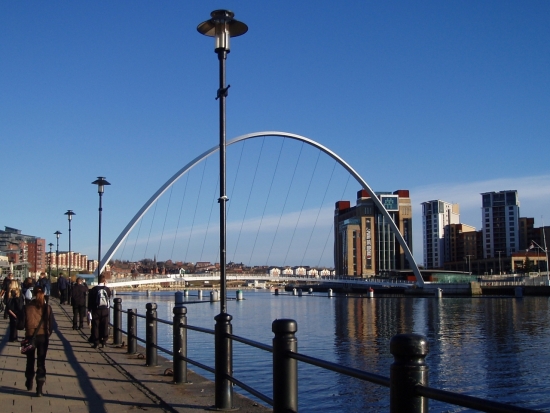One of Newcastle’s most iconic properties — built to symbolise the regeneration of the city’s Quayside — is on the market with a £6.6m price tag.

The glass-fronted Pitcher and Piano pub and restaurant, originally commissioned in 1995 by the Tyne and Wear Development Corporation and designed by Panter Hudspith, is being sold off by the Wolverhampton-based brewer and leisure chain Marston’s to generate investment cash.
Overlooking the city’s award-winning Millennium Bridge, the property is one of 20 UK Pitcher & Pianos in the Marston Group’s portfolio. According to agents CBRE the company intends to use the money to expand and improve its UK sites. Marston currently employs around 12,000 people and has an estate of about 2,150 pubs under various brands, including Pitcher and Piano and Tavern Tables.
The two-storey, 10,433sq ft Newcastle bar, which also has a 2,000sq ft riverside seating area, attracts year-round custom from neighbouring attractions such as the Baltic art gallery and Sage entertainment complex and nearby hotels and is claimed to generate an annual rental income of around £350,000.
Andrew Watt is a senior director of CBRE’s national specialist markets team. “The Pitcher and Piano is an established leisure destination and we anticipate very high levels of interest,” he said. “This represents a unique opportunity for an investor to acquire a high-profile investment with strong, long-term rental returns.”
The Quayside pub has attracted the attention of the Commission for Architecture and the Built Environment, which describes the stone and glass elevations of the Pitcher and Piano bar as drawing its inspiration from Newcastle Quayside’s history of shipping and industry.
“Set on the bend of the River Tyne, the bar’s location has a strong sense of place with the Millennium Pedestrian Bridge directly in front, the Tyne Bridge to the west, a new square to the rear, and the new Baltic Arts Centre now complete across the river in Gateshead, the Pitcher & Piano addresses its strong context confidently and appropriately,” the commission notes.
“The project demonstrates the clarity and finesse with which a relatively small building can be designed to complement distinguished, large-scale elements around it. The fact that this bar, completed in 1997, has become a popular venue makes its design merit even more relevant.”
Last year’s sale of the nearby Fever Bar, now renamed the Bridge Inn, is another indication that Newcastle’s Quayside is moving into a new phase of maturity. Plans were also unveiled recently to convert the historic Proctor House, within the heart of the Quayside’s conservation area, into a budget hotel.
“There is huge interest in the Quayside once again and the sale of both Fever and Proctor House is very encouraging for other licensed owners and tenants on the Quayside as well as the pub industry in Newcastle generally,” said Mark Worley, of business agents Christie & Co.
Previous Post
Government to Invest in Coventry 3D Printing Facility